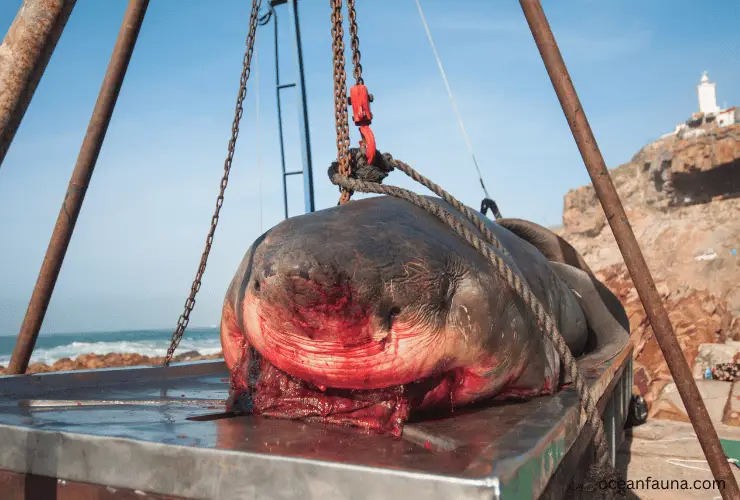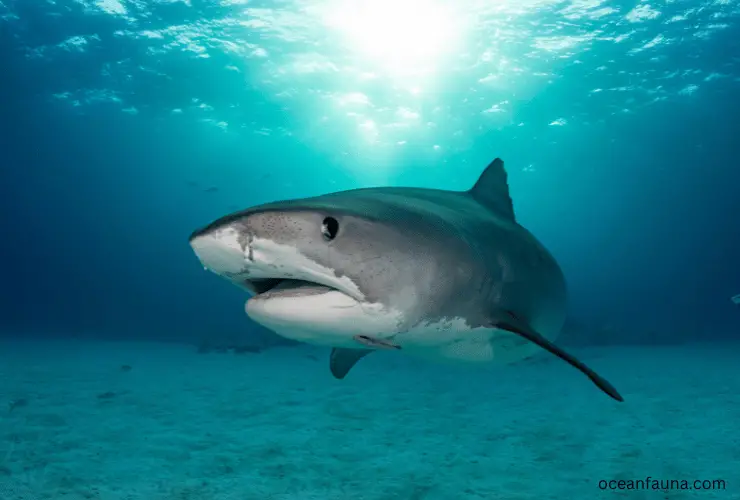Death is the natural end of any creature, even for the ultimate predator of the ocean-Sharks. But when it’s about the reason for death, it varies. People often ask, “How do sharks die?”
Well, several reasons work behind the death of sharks. Sharks can die due to old age, natural predators, disease or injury from another animal, and human activities such as overfishing, shark finning, etc.
In this article, I will discuss every reason in detail.
How Do Sharks Die?
It’s time to know each of the reasons for sharks’ death in detail.
Old Age
Old age is an unavoidable cause of death for sharks and all other species. As with humans, the life expectancy of a shark depends on its species and environmental factors such as food availability and water temperature.
Generally speaking, sharks can live up to 20-30 years. Still, there have been recorded cases of some individuals that have survived much longer than this.
Death due to old age becomes more common in mature and adult sharks as they tire with age. In contrast, juveniles are designed to survive better in harsher conditions. This natural culling of the older generations helps regulate the population sizes and maintain a healthy balance in shark populations.
Natural Predator
Even though sharks are revered as the top predators of our oceans, it is almost unbelievable that they also have predators.
Every species has its own predator, but most sharks’ main predator is the Orca or killer whale. Orcas have what is known as “sit and wait” predation tactics, where they will lie-in-wait for unsuspecting prey, such as some sharks, to come within close enough range for them to ambush and feed on them.
The other natural predators of sharks are killer whales and other large fish such as larger sharks, seals, and even squid. These animals will consume entire sharks or take bites from them, leading to the death of the shark.
Humans also hunt some species of sharks for food, although this is far less common than fishing for other species.
Disease and Injury
Disease and injury from natural causes are major reasons for the overall mortality rate of sharks. In recent years, there has been an unprecedented rise in documented cases of shark diseases and injuries due to environmental changes, like warming waters and pollutants.
Sharks with an impaired immune system are especially prone to the perils of disease and environmental conditions, such as viruses, bacterial infections, parasites, or even water temperature fluctuations or food scarcity. These issues can often be fatal for a shark under normal circumstances that could have been avoided if their immune systems were healthy.
Moreover, sharks may be injured in fights with other animals, such as seals or dolphins, or from being caught in fishing gear. If the injury is severe enough, it can be fatal.
Human Activity
If you ask what the actual main reason for the reduction of sharks’ quantity from the ocean is, then the answer is Human activity.

Humans are responsible for a great deal of mortality in the world’s shark populations through various activities. Let’s know which kinds of activities are responsible here.
Overfishing is one of the main human activities that can cause death to sharks. This happens when fishermen catch too many fish, including shark species, faster than they are able to reproduce.
As a result, the population of some shark species has declined drastically in recent years, leading to their population becoming threatened or even becoming extinct in some cases.
Shark finning is another human activity that can lead to the death of sharks. Shark finning involves cutting off a shark’s fins and discarding the body into the ocean.
This practice has become widespread due to the high demand for shark fin soup. Removing the fins causes immense suffering and stress for sharks, often resulting in their death shortly after being released back into the water.
In addition to these two practices, there are other human activities that can contribute to sharks’ deaths, such as pollution and habitat destruction.
Pollution from both land-based sources (such as agricultural runoff) and ocean vessels can decrease water quality and reduce oxygen levels in aquatic habitats, which can harm or kill sharks living there.
Furthermore, humans have also caused damage to essential habitats like coral reefs which provide food and shelter for many species of sharks. Ultimately, this destruction leads to reduced numbers of surviving sharks in these areas and further contributes to their population decline worldwide.
FAQs
What happens to a shark’s body when it dies?
When a shark dies, their body decomposes in the water columns like any other animal’s. Bacteria will break down the proteins and fats in the shark’s body, stripping away meat from the bones.
Over time, the cartilage in the skeleton will dull to a grey-white color as the minerals disperse into the water. As decomposition continues, only bones will remain of what was once a magnificent predator of the ocean.
If they are buried deep enough underwater, oxygen may not be able to reach them and preserve them, causing what’s left of the shark to disintegrate until nothing is left except its memory among those who knew it best.
How do great white sharks die naturally?
Great white sharks are one of nature’s most highly evolved predators and generally enjoy a long lifespan; however, like all living creatures, they must eventually succumb to death. The natural lifespan of a great white shark is estimated to be around 50 – 70 years, depending on various factors such as habitat and health.

Death in the wild primarily comes from old age, although great white sharks may also die due to decreased fertility or injury from prey or other animals. In some cases, the disease is another factor that can cause these majestic creatures to pass away prematurely.
Despite their daunting reputation in the wild, great whites normally have a relatively peaceful end as these apex predators slowly drift off into the night.
Why do sharks die when they stop swimming?
Sharks are ocean predators known for their unique set of adaptations to survive in the open ocean. But one trait that isn’t as widely known is why sharks die when they stop swimming.
It boils down to the fact that sharks have something called a ‘ram-jet’ system, which means that water is continuously passing over their gills, allowing them to take in oxygen from the water around them.
If a shark stops swimming to rest, it cannot take in enough oxygen, and its blood becomes severely depleted, leading ultimately to death if it does not resume swimming.
This is why scientists have been increasingly concerned about shark populations due to commercial trawling and other fishing practices since these animals can easily become exhausted and die if they are unable to move freely.
Do sharks drown when they die?
When you think of sharks, you likely think of their intimidating nature and extraordinary swimming abilities. So, it is a surprise to many that drowning is one of the most common causes of sharks’ death.
Early studies on the topic suggested that when a shark dies, its muscles will relax and cause it to sink beneath the surface. In turn, they suffocate due to an inability to reach the surface for oxygen.
Recent research suggests otherwise; however, rather than sinking out of sheer exhaustion after death, sharks have demonstrated an ability to remain at the surface through slight movement in their fins. This action supports oxygen exchange and keeps them afloat until decomposition begins – sometimes lasting a few days or weeks!
Ultimately, although dolphins might be known as one of the only creatures that can consciously choose not to breathe underwater, certain shark species have evolved a survival mechanism ensuring they can stay afloat following death – though we don’t know why yet!
Do sharks die after eating humans?
Usually, humans are not considered primary prey for sharks. And if somehow, sharks bite humans, in most cases, they will spit it out. But there is a question of what the impact is upon sharks after eating a human.
Experts in the field of marine biology have long debated the idea that sharks die after eating humans. While there are accounts from survivors of shark attacks who claim to have seen a shark go limp and sink toward the ocean floor following an altercation, no hard evidence exists to prove whether this is true.
Some researchers point out that many shark species eat marine life far larger than humans, and death does not occur, so it would be unlikely for a much smaller human body to cause mortality.
Others remark that due to the complexity of a shark’s digestive system, consuming any foreign material is likely to lead to gastrointestinal issues, possibly contributing to death in rare cases. At present, there is simply not enough data available to confirm or disprove whether sharks die after eating humans.
Conclusion
Now that you are aware of the primary reasons for sharks’ dwindling numbers and human activities leading to their population decrease, it is time to take immediate action.
We must make an effort to safeguard these indispensable species so we can preserve a well-balanced marine ecosystem. To do our part in this endeavor, we should endorse sustainable fishing methods, forbid shark finning altogether, reduce pollution levels drastically, and defend important habitats whenever possible.


2 thoughts on “How Do Sharks Die?”